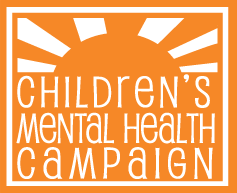In recognition of Mental Health Awareness Month, we would like to take an opportunity to spotlight the work of the Children’s Mental Health Campaign (CMHC), a Massachusetts-based initiative.

CMHC was created in 2007 as a partnership between the Massachusetts Society for the Prevention of Cruelty to Children (MSPCC) and Boston Children’s Hospital. The idea was to create a broad coalition of organizations dedicated to accessible, quality mental health services for children and families. The network both advocates for systems and policy change and supports innovative pilots and scaling solutions that work. Now over 200 members strong, CMHC has built an executive committee that includes the two original founders and leaders from the Parent/Professional Advocacy League, Health Care for All, Health Law Advocates, and Massachusetts Association for Mental Health.
You can learn more about CMHC on their website or YouTube page.
The Tower Foundation has supported several initiatives supported by CMHC and spearheaded by its member agencies. Here we briefly profile two programs that we have supported over several years.
Mental Health Advocacy Program for Kids
Mental Health Advocacy Program for Kids (MHAP 4 Kids) is a program run by Health Law Advocates. Health Law Advocates is a public interest law firm that provides pro bono legal services aimed at improving access to physical and behavioral health care across Massachusetts. MHAP 4 Kids focuses on a model that would provide all youth in Massachusetts needing behavioral or mental health services with access to skilled advocates embedded in Massachusetts Family Resource Centers, of which there are 22 across the Commonwealth. Advocates can connect youth with mental health supports, assist with eligibility for special education services, help secure insurance coverage, and negotiate accommodations in general education settings. Health Law Advocates has been able to demonstrate the success of this program, leading to state budget appropriations that support 64% of program costs. (Health Law Advocates commissioned an initial program evaluation from the Boston University School of Public Health, and is currently working on a second round of evaluation.)
Don Matteson, the Tower Foundation’s Chief Program officer observed that,
“Health Law Advocates has done such a great job over nearly ten years to evolve this program from the original idea of serving court-involved kids with mental health issues through the juvenile courts to what they’re doing now. Working through the Family Resource Centers puts them in a position to help so many more children and families get the supports they need. These MHAP 4 Kids attorneys really listen to what families need and do a super job of helping them get it.”
Behavioral Health Urgent Care Model
MSPCC and Massachusetts Association for Mental Health are leading an initiative exploring better ways to support families of children with mental health conditions that become acute. The Tower Foundation has supported components of this work that include children with a mental health condition and co-occurring autism or other intellectual disabilities. A study commissioned by CMHC, found that 87% of young people with an intellectual disability that present at hospital emergency departments with a mental health crisis end up boarding there until space opens up to admit the youth. “Boarding” in an emergency department context is defined as a stay of 12 hours or more. Of those youth that boarded, 47% boarded for three days or longer. Emergency department boarding is traumatic for youth and their families as well as a highly expensive drain on the system. More services are needed to help manage mental health crises, and to keep families from having to go to the emergency department in the first place.
CMHC has published a paper on its research and recommendations for systemic improvement (Pediatric Behavioral Health Urgent Care, 2nd Edition: Including Considerations for Meeting the Needs of Children with Autism Spectrum Disorders and Intellectual and Developmental Disabilities). Team members visited crisis response centers in Arizona and Rhode Island to study best practices for easily accessible walk-in services for immediate mental health interventions that are more appropriate than most emergency room responses. Emergency departments just don’t tend to respond well to people with acute mental health presentations, with or without a co-occurring autism or intellectual disability diagnosis. Furthermore, boarding while in crisis can make mental health conditions worse.
“What this report provides is a roadmap away from a system that really works for no one to something totally new,” says Megan MacDavey, Tower Foundation Program Officer. “Families suffer from extended stays in hospitals, which costs hospitals money, and there are too few beds dedicated to children to actually even make this system work if we wanted to. The CMHC is thinking creatively and reimagining a whole new system of care for people who have an urgent behavioral health need.”
Urgent behavioral health care, as the CMHC has detailed in this report, responds to needs of children and adolescents that fall short of posing an immediate risk of harm to themselves or others. Urgent care would include a rapid assessment, treatment planning, behavioral health treatment initiation, integration of ASD/IDD care planning, and connection to higher levels of care as needed. This new system of care would build on the strengths of the current mental health care system and make the experience less time-consuming and frustrating for families.
The CMHC has identified a number of opportunities to pilot components of this urgent behavioral health care model and lay the foundation for this work moving forward. In the meantime, CMCH’s advocacy has already resulted in some successes. The ability of providers to shift to tele-health and tele-psychiatry during the COVID-19 pandemic was aided by CMHC’s work to make these services more generally available. Other approaches backed by CMHC are gaining traction, such as more providers offering Applied Behavior Analysis interventions as an effective way to avoid trips to the emergency room. The mix of solutions also includes more community-based alternatives to the ER like mobile crisis intervention teams.

